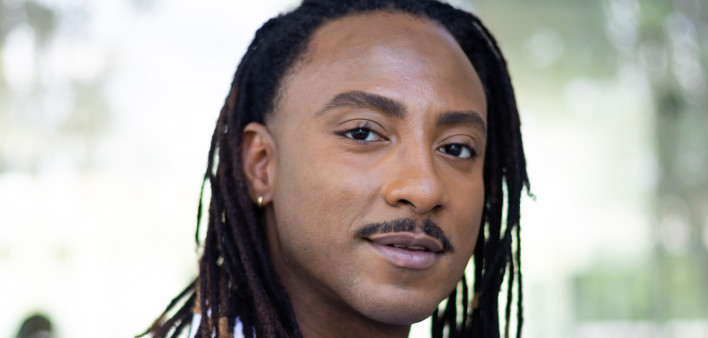Interview conducted by Alex Garner of MPact
We all discover different ways to express our HIV-positive status. Alberto Pereira Jr. has utilized his dynamic creativity, his cultural experience, and his fearlessness to create a narrative about what it means to live with HIV, particularly as a Black gay man in Brazil. He is a journalist, director, and actor, and leading voice on issues relating to blackness, LGBTQ and living with HIV. He continues to integrate the diverse parts of himself to fully express who he is, increase visibility and dismantle stigma. We wanted to talk with Alberto to explore the power of self-expression, the value in our stories, and the power in finding joy.
You can find Alberto’s work here and follow him on Instagram.
You created a performance piece entitled, “Please Touch Me” which was part of your coming out about HIV. Why did you decide to use your art as a means to come out?
I call myself a social artist, mixing my background as journalist, documentarist TV director and actor in theater in all my works. Back in 2019, when I came out as a person who lives with HIV, it was the first year of Jair Bolsonaro’s presidency in Brazil. The rise of the extreme right wing to the top of national power in the country. Bolsonaro stated that antiretroviral drugs were a “waste” of public money and wanted to cut funds for HIV policies. Back then, I’d been private about my seropositivity status for the past 10 years. Only my closest relatives, a few friends and a few ex-boyfriends were aware of it. During all those 10 years, HIV never stopped me. I can say that my journey is positive, both because of my positive diagnosis with HIV and also because of all the personal and professional achievements I have had. And because I make a point of including my social markers, such as my blackness and homosexuality, in my works and projects, it was time to bring myself out of my last closet: being HIV-positive. I started studying more about art and HIV and during a workshop I was sparked to create something. We were in a museum, full of “Do not touch” written signs. Suddenly, I was inspired by that and created “Please Touch Me”. The performance piece consisted of me offering my self-declared black, queer and HIV-positive body to the audience’s touch, in hopes that it would produce empathy, and, purge and cure social stigmas.
What was the reaction to your piece and your HIV coming? Was it what you were expecting?
For both moments, I can say that it was surprisingly moving. During my performance presentation in the museum, people had really engaged. They understood my calling for exchange and affection. I was wearing a white T-shirt, some of my characteristic written in it: Black, Queer, Sagittarian, Undetectable… They started touching my arms, my shoulder, my hair. Some people hugged me or kissed my cheeks and my forehead. It was very gentle and human. They understood that I was offering connection. After that, I posted online some photos from the performance and also gave an interview to a national magazine about it. And the repercussion was equally positive. Full of affection, messages of encouragement, people who I already knew revealing their seropositivity and their personal experiences. I said it was so moving because I wasn’t expecting anything. I was totally open to feel the experience and think about it afterward.
Why is it important for you to speaking openly about being gay and living with HIV in Brazil, particularly as a black man? I am a Brazilian black gay man born and raised in São Paulo, living with HIV for the past 14 years. On this September it will be complete 15 years since my diagnosis. Since my childhood I was aware about my blackness and what that means here in Brazil: the last country to abolish slavery on the American continent, in addition to being the country that received the largest number of enslaved people in the Americas. Racism, prejudice, lots of social barriers to overcome… even for a Brazilian black middle-class family like mine, with both parents having graduated from university and working hard to provide a better life for me and my older brother. I was growing up and understanding that other personal characteristics, in addition to my blackness, made me an easy target for prejudice and other difficulties, separating me from the status quo. Firstly, my homosexuality. Then, being a person living with HIV. Characteristics that other people may also have and that do not make us better or worse than anyone else. Becoming aware of this made me start to debate and reflect on these themes in my work. It made me want to break out all the closets and talk openly about it.
You recently got married. Why do you think it’s important to demonstrate queer black joy and what impact can that have on the community? Demonstrating and celebrating our relationships and affections is naturalizing our existence. We, LGBTIQA+, are also human beings, we have humanity. We live in society, we deserve and demand respect and the same opportunities to fully realize ourselves, to be truly happy. Our wedding, first and foremost, was a dream come true and a celebration of our love. Just like living, loving is a political act. An active choice made daily. Experiencing gay, black and serodiscordant love in Brazil is a daily choice. I believe the impact is positive because it is the expression of a real and possible love. We are all entitled to this.
What do you think is needed to build a community of queer people living with HIV in Brazil?
To create a true and diverse community of people living with HIV in Brazil, we first need to talk more openly about the subject in Brazil. Demystify social stigmas. Unfortunately, more than 40 years after the start of the epidemic, HIV is still the target of a lot of misinformation and prejudice. Misinformation and prejudice that, even today, result in deaths and segregation.
You’ve been very open about your status since 2019, how does speaking openly about HIV help reduce stigma? Talking openly about being a person living with HIV is, at the same time, humanizing the story of millions of people who have been victims of prejudice for so long. It is to offer a perspective of life and not death to the topic.
You created a bloco, Domingo Ela Não Vai, in Sao Paulo, describe how it is part of celebrating queer people of African descent? Carnival is an extremely popular and traditional festival here in Brazil. Although it has European origins, the celebration gained new contours when influenced by native indigenous populations and Africans brought as slaves. Carnival celebrates the culture, music, nature and joy of a nation. As a black man (and also a gay and positive man), the right to celebration, joy and pride in being who we are, in our bodies and in our loves is the reaffirmation of our existence, challenged daily by various forms of violence. Being able to be part of the production of a cultural event of this magnitude is fulfilling.
What message would you share with a young gay man in Brazil who just tested positive?
First of all, you are not alone! You are now part of a huge community. A community of millions of people living with HIV. A community that lives, loves, works and tries hard to move forward every day. Science has evolved a lot. Our HIV-positive existence must be described by our ability to achieve, to love, to be happy. Don’t allow anyone to tell you differently or make you feel otherwise.
MPact Global created this column as a way to explore the unique experiences of queer people living with HIV all around the globe. We strive to amplify diverse voices and explore topics that impact the daily lives of HIV-positive people, from sex, to culture, to community, to self-expression.










